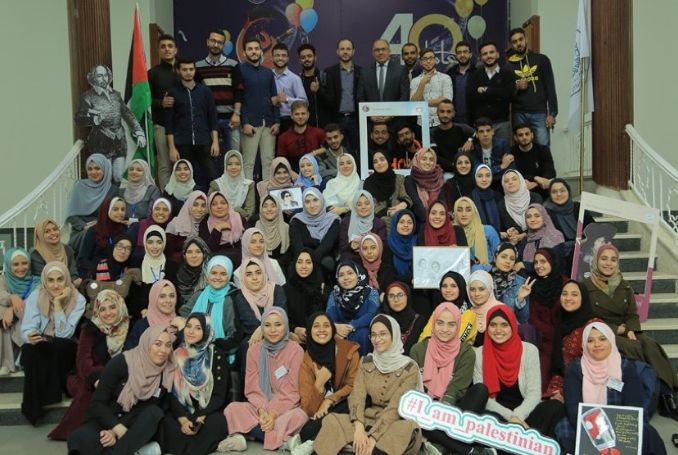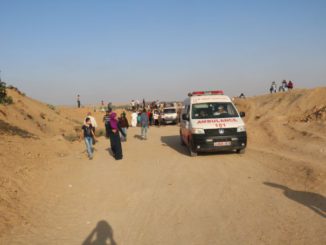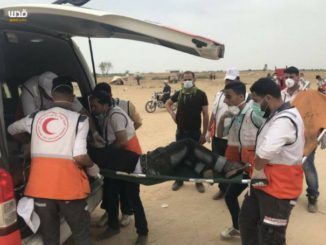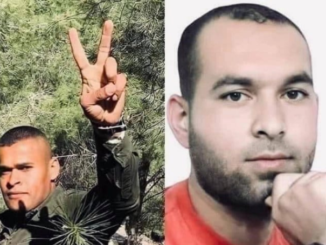
By Benay Blend
“Despite the fact that I speak and I can’t be heard! I still like this event so hard! I Wish it never ends,” exclaimed Marah Mahdi, a student at Islamic University Gaza (IUG) where the Grand English Poetry Festival, held on December 2, has been attracting attention for the past several days.
In a recent interview, English Department professor Mosheer Amer explained that this event provides a learning experience for the students as well as an opportunity to demonstrate their own “amazing talents in writing poetry.”
Marah’s comment sums up both the excitement displayed by so many students who are attending the festival, but also a broader message about the meaning of poetry for a people under constant siege.
As Ramzy Baroud observes, Gaza is an “abode of poetry,” inspiring activists around the world not only because of its increasing number of martyrs but also because it is home to creative voices like Marah, who resist the Occupation through their love of life.
Prof. Amer also extended his appreciation to Prof. Refaat Alareer, Vice-Dean of the Faculty of Arts, who helped organize the event along with more than 100 young people from the department. Alareer deserves mention because of his long-term devotion to the welfare of his students.
Editor of Gaza Writes Back: Short Stories from Young Writers in Gaza (2014,) Alareer gathered the writings of fifteen young people who had experienced “Operation Cast Lead,” Israel’s 2008-2009 offensive which inspired them to use writing as an outlet for their trauma. Significantly, though, they also saw the collection as a means to preserve Palestinian stories, including those of their families as well as their own experiences during the Israeli siege.
During the 2014 shelling, IUG, where Alareer has taught world literature and creative writing, was hit by several Israeli missiles. As he recalls, not only did buildings suffer damage, but because books, as well as other commodities, became scarce because of the consequent Israeli blockade. For Alareer, the challenge was to teach with very few resources while holding fast to IUG’s mission of promoting “open-mindedness, dialogues, and respect to all cultures and religions.”
Writing in the Electronic Intifada, Alareer depicted the attack as a “personal and collective loss and ongoing trauma” both for him, his colleagues and his students. During the siege, his brother was killed when an Israeli bomb struck his home, a personal loss that joined the more than 2,100 Palestinian men, women and children murdered during the seven-week assault.
As a consequence of the 2014 bombing, Alareer’s office, along with his exam papers; the department library, and much more—all gone. Israel’s excuse? According to its defense minister, IUG was really a weapon development center (in disguise?), IUG was developing chemical weapons, and so on with the usual vindications.
In response, Alareer’s students joked that he was developing Poems of Mass Destruction (PMDs), Theories of Mass Destruction (TMD), and in reality, they were right. Why would Israel bomb a university, the professor pondered, and then answered his own question:
“Some say Israel attacked IUG just to punish its 20,000 thousand students or to push Palestinians to despair. That is true, but to me, IUG’s only danger to the Israeli occupation and its apartheid regime is that it is the most important place in Gaza to develop students’ minds as indestructible weapons. Knowledge is Israel’s worst enemy. Awareness is Israel’s most hated and feared foe. That’s why Israel bombs a university; it wants to kill openness and determination to refuse living under injustice and racism.”
This sentiment was corroborated by Rami Almegari, who also taught at IUG during the 2014 bombing. “The bombing of the Palestinians universities is not only an abuse of academic freedom,” he asserted, “it is an attempt to prevent us from enjoying the basic necessities that we need to get by.”
Flash forward to early December 2019 to witness the IUG English Department’s Grand Poetry and exhibition lasting over a span of several days. Held in the Main Conference Lobby, students explore ten informative corners each focused on consecutive eras of literary history.
The project aims to develop networking among international researchers and educators, supported by Durham University in the United Kingdom as well as institutions of higher learning in Turkey. Though the Festival highlights poetry from many eras and countries, Marah writes a caption over a photo of a cardboard figure of Shakespeare at the conference, replete in European garb but draped with a keffiyeh: “They’re Palestinian! Even if they perfected their English!”
Significantly, the culmination of the exhibit’s literary chronology highlights Palestinian poetry, including poems written by IUG students. After the conference, the English department hopes to compile the poems into a book.
Very much like Gaza Writes Back, this collection will be a testament to writing as resistance, what Alareer said that Israel targeted when it bombed his university. The Festival and the excitement that faculty and students will carry with them after its end are a testament that Israel failed in its mission, yet again.
In his “Welcome” to This is Not a Border: Reportage and Reflection from the Palestine Festival of Literature (2017), Mahmoud Darwish reflects on the issue of personal responsibility in the wake of gross injustice. The writer’s goal, Darwish explains, consists of a “search for truth” (p.7), a quest that takes on a particular meaning for Palestinians who, he claims, are erased from the history of their own country. Embodying what Darwish calls the writer’s role, Alareer and his students have found in words a refuge to create change.
On her Facebook page, Marah Mahdi displays an excerpt from Dareen Tatour’s poem “Resist My People, Resist Them,” a piece that landed Tatour in prison for alleged incitement to violence. Her case went on for years until May 2019, when an Israeli court partially overturned the conviction.
To Tatour, Marah says: “Thanks for writing! Never stop raising our voice!” I’m pretty sure that Marah’s words, along with the other poet/students in attendance, will be heard long after the Festival is over.
– Benay Blend earned her doctorate in American Studies from the University of New Mexico. Her scholarly works include Douglas Vakoch and Sam Mickey, Eds. (2017), “’Neither Homeland Nor Exile are Words’: ‘Situated Knowledge’ in the Works of Palestinian and Native American Writers”. She contributed this article to The Palestine Chronicle.

– Benay Blend earned her doctorate in American Studies from the University of New Mexico. Her scholarly works include Douglas Vakoch and Sam Mickey, Eds. (2017), “’Neither Homeland Nor Exile are Words’: ‘Situated Knowledge’ in the Works of Palestinian and Native American Writers”. She contributed this article to The Palestine Chronicle.








